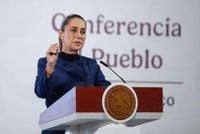The music world was shaken this week by the grim discovery of two Colombian musicians, Byron Sánchez—known as B-King—and Jorge Herrera, who performed under the stage name Regio Clown. After vanishing on September 16, 2025, in Mexico City, the two were found dead a day later in Cocotitlán, a municipality just southeast of the sprawling metropolis. Yet, it was not until September 22 that authorities officially identified their bodies, bringing to a close a harrowing week of uncertainty for their families, fans, and the international community.
According to the Black Promoters Collective and Mexico News Daily, Sánchez and Herrera had been on tour in Mexico, their last known whereabouts traced to the upscale Polanco neighborhood in Mexico City. The disappearance sparked immediate concern, not least because Sánchez had just days earlier expressed his excitement about performing in Mexico for the first time. In a heartfelt Instagram post, he wrote, “Thank you so much, my beautiful and beloved Mexico,” sharing a video that captured his anticipation and dreams of musical success in the country.
The Mexico City Prosecutor’s Office wasted little time, launching an investigation and gathering testimonies and video footage to retrace the duo’s final steps. Their efforts quickly pointed to the State of Mexico, prompting collaboration with the State’s Attorney General’s Office. Forensic teams there matched the missing musicians’ profiles to two bodies found on September 17 in Cocotitlán. Sánchez’s family was called to identify his remains at a regional prosecutor’s office, a moment that confirmed the worst fears and set the stage for a homicide investigation.
“Thanks to this coordination, forensic services personnel from the Mexico State Attorney General’s Office compared the profiles of the missing persons and found matches with two deceased individuals who were located on September 17 in the municipality of Cocotitlán. In light of these facts, the Mexico State Attorney General’s Office is conducting a homicide investigation,” the authorities stated, as reported by the Black Promoters Collective.
The tragedy quickly became an international incident. Colombian President Gustavo Petro took to X (formerly Twitter) to express his outrage and grief, declaring, “They murdered our youth in the United Mexican States.” He went further, criticizing what he called the “stupid military and prohibitionist policy, called ‘the war on drugs’” that, in his view, fuels violence and claims the lives of young people across Latin America. Petro’s words were a direct rebuke of the broader anti-drug strategies that have so often entangled both Mexico and Colombia in cycles of violence.
Petro’s involvement did not stop at public condemnation. Before the bodies had been officially identified, he publicly requested assistance from Mexican President Claudia Sheinbaum, urging her and the Colombian diplomatic corps in Mexico to do everything possible to locate the missing musicians alive. “I ask the President of the United Mexican States, Claudia Sheinbaum, my friend and comrade in struggle since M19, and the entire diplomatic corps of Colombia in Mexico, to ensure that the singer Bayron Sánchez and his fellow band member Jorge Herrera appear alive,” he posted. The reference to M-19, a Colombian urban guerrilla group from the 1970s and 1980s, was met with a smile and a quick denial from Sheinbaum, who said, “I’m not going to get into a debate with President Petro.”
For her part, President Sheinbaum addressed the murders during her morning press conference on September 23, calling the deaths “an unfortunate episode.” She was quick to reassure observers that the incident would not disrupt the diplomatic relationship between Mexico and Colombia. “There is no reason it would affect the relationship between Mexico and Colombia,” she stated, emphasizing that the Ministry of Foreign Affairs was in contact with Colombian authorities and that the case was being handled by the Mexico City Attorney General’s Office and her security cabinet. Sheinbaum also clarified that the missing persons report had been filed in Mexico City, not in Sonora as initially mentioned by President Petro.
As the investigation unfolded, Mexican news outlets began linking the deaths of Sánchez and Herrera to La Familia Michoacana, a notorious cartel designated as a foreign terrorist organization by the United States. Adding a layer of complexity to the tragedy, reports cited by Reuters indicated that Sánchez was the nephew of Camilo Torres, alias “Fritanga,” a prominent Colombian cartel leader. While these connections remain under investigation, the possibility of cartel involvement has fueled speculation about the dangers facing musicians and other public figures working in regions where organized crime wields significant influence.
The deaths have also reignited debate about the safety of international artists in Mexico, a country where violence against performers—especially those associated, even tangentially, with organized crime—has been a persistent concern. Fans and fellow musicians expressed outrage and sorrow across social media, calling for justice and greater protection for artists who travel to Mexico for work. The case has become a touchstone for broader anxieties about public safety, the reach of criminal organizations, and the international dimensions of drug-related violence.
Meanwhile, the authorities have kept the details of the case close to their chest. Sheinbaum deferred further information to the Mexico City Attorney General’s Office, signaling that the investigation was ongoing and that more would be revealed in due course. For now, the homicide investigation continues, with officials from both Mexico and Colombia remaining in close contact.
The story of Sánchez and Herrera is a tragic reminder of the risks that can accompany artistic ambition, particularly in regions marked by violence and insecurity. It is also a story of international cooperation, as two countries work together to seek justice for the slain musicians and provide answers to their grieving families. As the investigation proceeds, the world watches, hoping for accountability and, perhaps, a renewed commitment to addressing the root causes that made this tragedy possible in the first place.
In the end, the loss of Byron Sánchez and Jorge Herrera leaves a void not only in the Colombian music scene but also in the hearts of those who believed in the power of art to transcend borders. Their final journey to Mexico, meant to be a celebration of music and cultural exchange, has become a somber chapter in the ongoing struggle against violence and impunity.




